Text
The words sound fine in my head, but the moment I write them down suddenly they become the single worst thing mankind has ever put to paper.
why books take so long to write
75 notes
·
View notes
Text
Oh that sounds cool as hell!
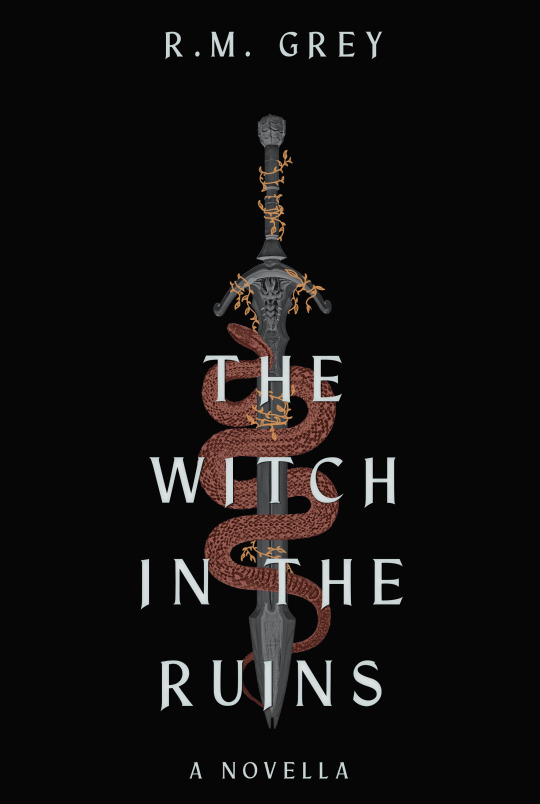
"A foul odor filled the air. Old blood mixed with decaying flesh."
The Witch in the Ruins is an upcoming sapphic dark fantasy novella written by yours truly. It will be my debut and should be released as an ebook by this Fall, 2023.
🗡 sapphic
🗡 Dark fantasy world
🗡 horror elements
🗡 action
38 notes
·
View notes
Text
I got this comment on a story from my Other AO3 Account this morning.

(Info redacted because I prefer keeping these accounts separate but no one follows me on the side blog I have for that account.)
The story was posted almost a year ago and is relatively “popular” by my average statistics even though it has tropes and themes that are big turnoffs for a lot of people (hence separate accounts). This popularity is undoubtedly because it’s a Marvel Loki story and that fandom is massive.
So there is obviously an algorithm or a bot scrubbing ao3 statistics and leaving this comment on fics that meet a certain metric with the main character of the fic inserted into the comment.
I had a little time to kill this morning so I decided to investigate further. And y’all this is so predatory. Come on this journey with me. It made me mad. It may make you mad.
First, if you go to Webnovel’s website, you HAVE to choose between male lead or female lead stories before you can go any further. WTF?
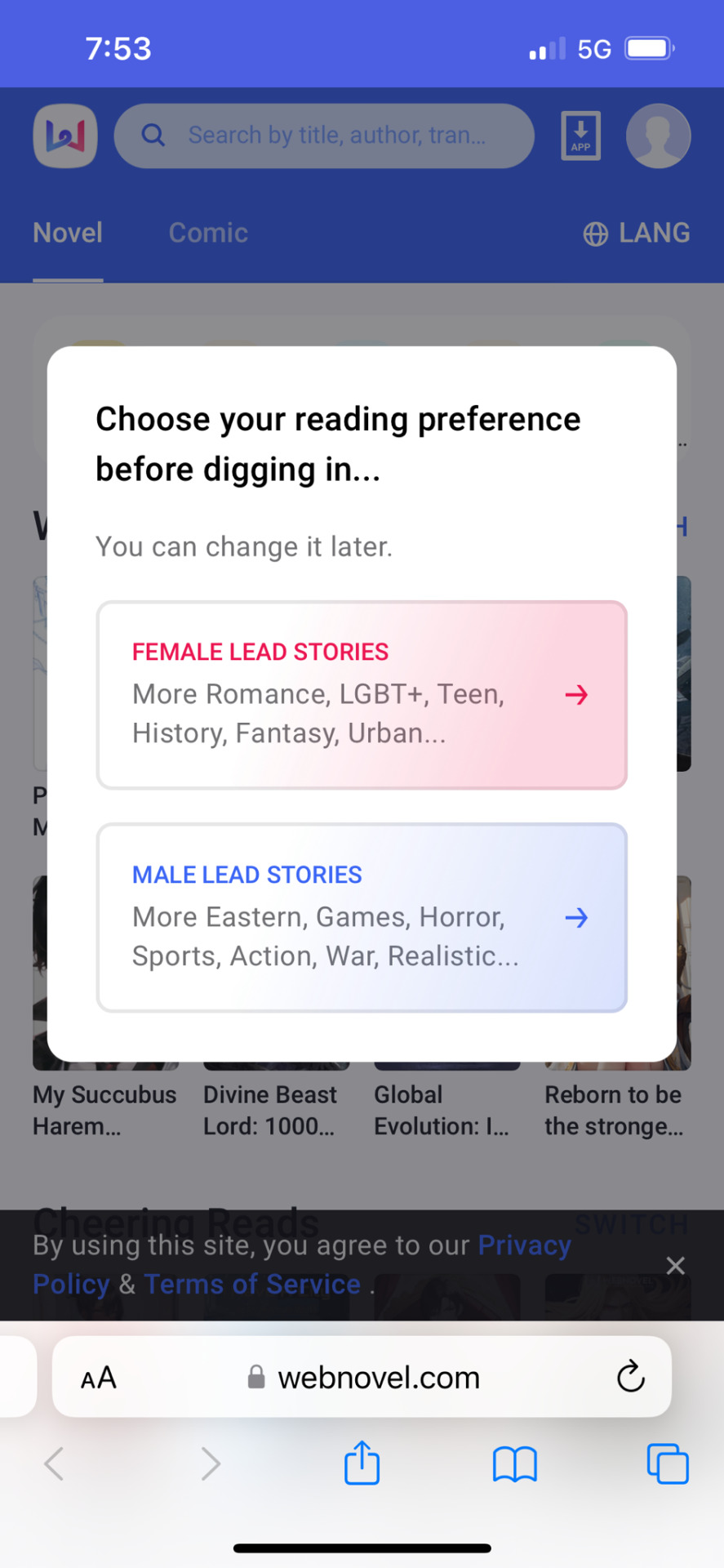
And that’s weird, but this gets so much worse. This is basically a pay-to-read site that has different subscription models. Which… okay BUT! The authors don’t get paid! Look at that comment again. They’re promising a supportive and nurturing community, but zero monetary compensation. It’s basically, “post your stuff here so we can get paid and you can get… nice vibes?” I mean look at this Orwellian writing:
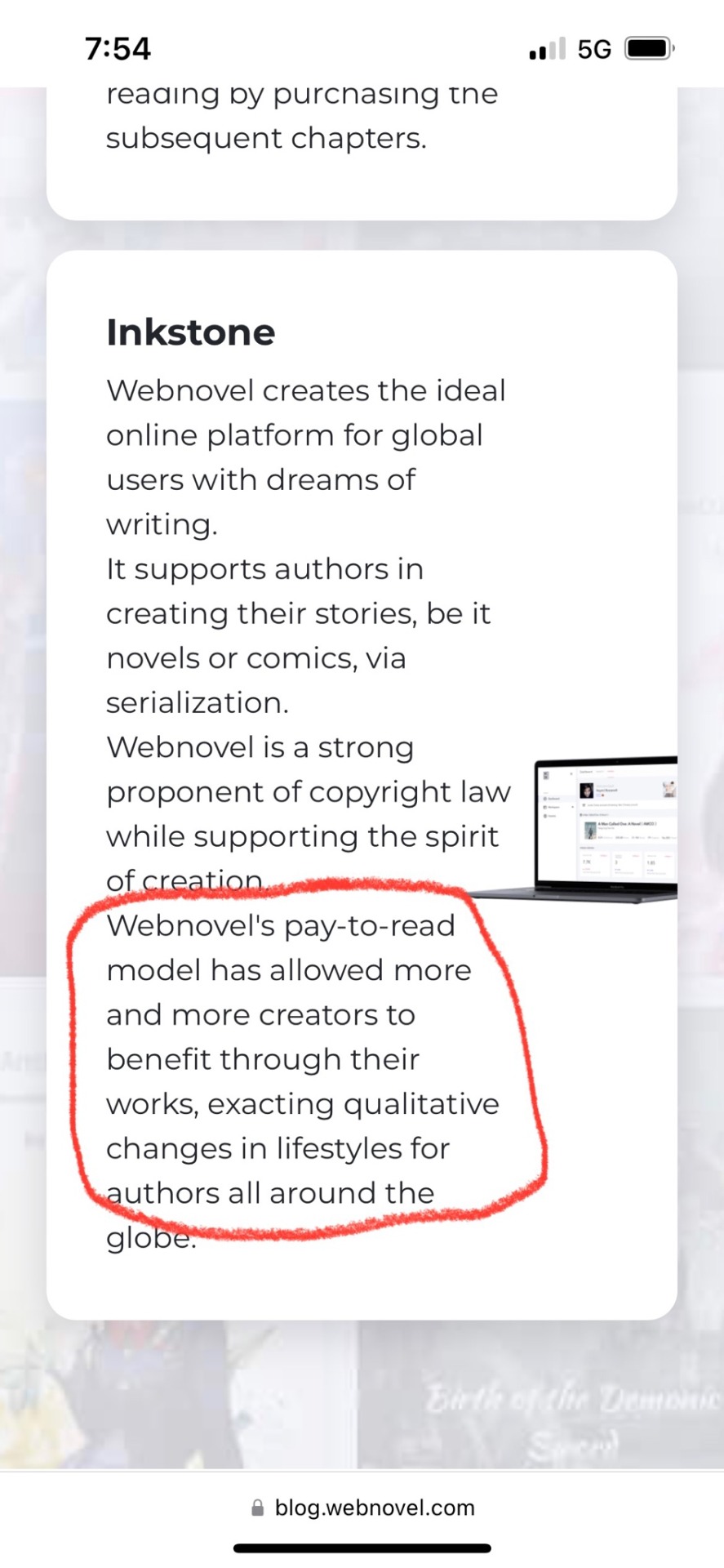
Using the phrase “pay-to-read model” in the same sentence as “qualitative changes in lifestyles for authors” deliberately makes you think that you can get paid and maybe even make a living on this website. But that’s not actually what it says and authors will not receive one red cent.
Oh but wait, the worst is still to come. In case this breaks containment (which I kind of hope it does) this is where I mention that I’m a lawyer in the US.
I don’t do intellectual property or copyright law but I do read and write contracts for a living. So I went to look at their terms of service. It was fun!
Highlights the first, in which Webnovel gets a license to do basically whatever they want with content you post on their site. This is how they get to be paid for people reading authors’ writing without paying them anything.
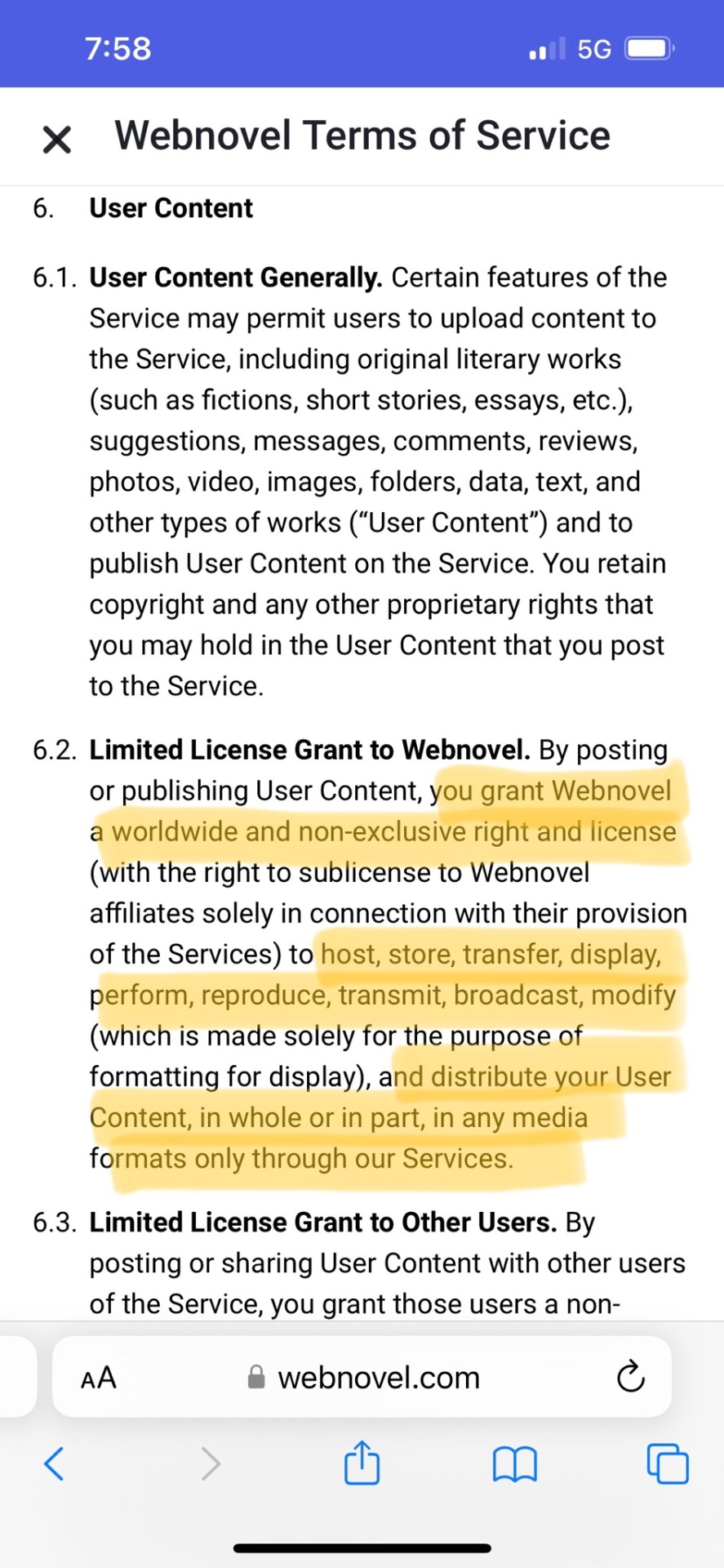
Highlights the second, in which Webnovel takes no responsibility for illegally profiting off of fan fic. This all says that the writer is 100% responsible for everything the writer posts (even though only Webnovel is making money from it).
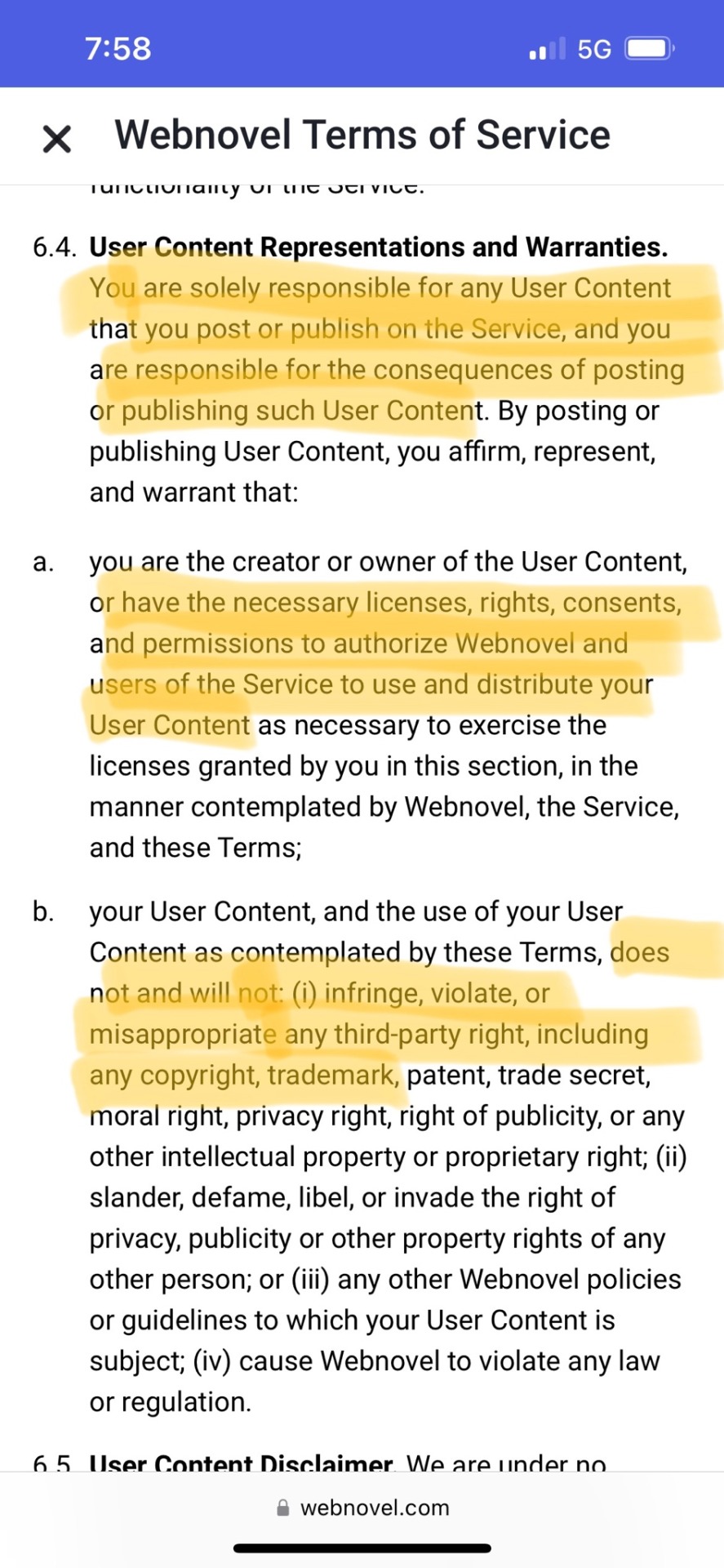
Highlights the third which say that by posting, the author is representing that they have the legal right to use and to let Webnovel use the content according to these terms. So if a writer posts fan fiction and Webnovel makes money from people reading the fan fiction, and the House of the Mouse catches wise, these sections say that that’s ALL on the writer.
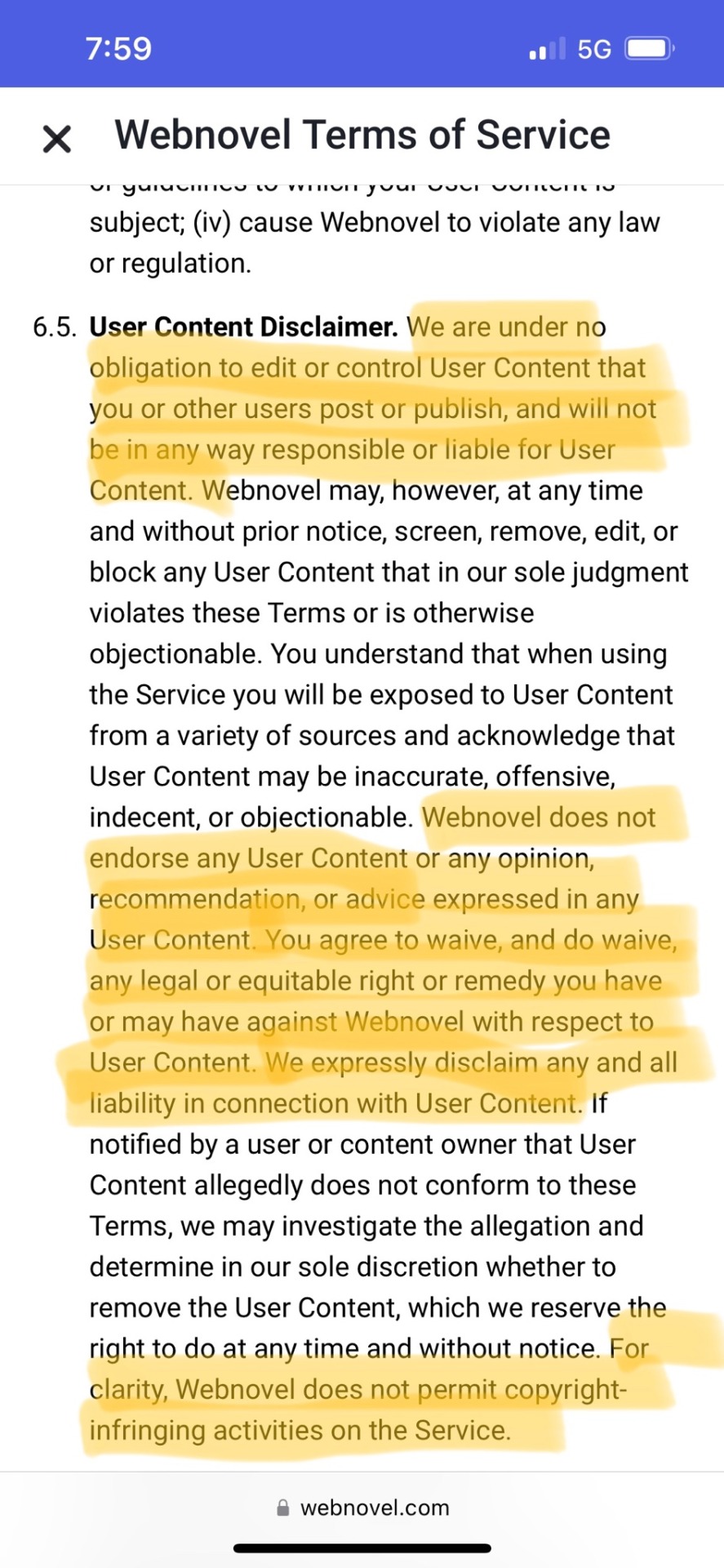
So that’s a little skeevy to start off with but the thing that is seriously shitty and made me make this post was that these assholes are coming to ao3. They are actively recruiting people in comments on their fan fiction. And they are saying they are big fans of the character you’re writing about and that they share your interests.

They are recruiting fan fiction writers and giving every impression that you can make money from posting fan fiction on their site and hiding the fact that you absolutely cannot but they can make money off of you while you try, deep in their terms of service which no one but a lawyer who writes fan fic and has some time to kill will read.
I see posts on here regularly from people who don’t understand how this stuff works, don’t understand that they (and others) can not legally make a financial profit from fan fiction. And there are tons of people who will not take the time to dig into the details.
Don’t deal with these bastards. Fuck Webnovel.
52K notes
·
View notes
Text

I was walking through the toy aisle at Target when I found this thing and had a VIOLENT AND IMMEDIATE FLASHBACK to when JP first came out and they had a bunch of REALLY COOL T Rex toys that I would have sold one of my scrawny small-child limbs for but my mother wouldn’t get me one because they were “too violent and also ate people” :(
519K notes
·
View notes
Text
Additionally, to everyone thinking "Jerky and hardtack" as the only alternatives, I would point out that traditional pies were often the food of choice for people traveling for one or two days.
Hot water crust pies were originally a way to keep the filling safe and unspoiled for a few days; the crust itself would be thick, tough, and generally unpalatable, because it was supposed to be durable enough to withstand jostling about without breaking. Then, when someone wanted to eat it, they would crack it open and eat the filling, the crust being as basically inedible. Of course, the crust was often eaten as well, but that wasn't the intent. It's a similar idea to cornish pasties, which were taken into the coal mines by cornish workers. The outer crust would be ruined by coal dust, but the miner could still break it open to get at the still edible filling. The filling could even still be warm from the oven by the time they did.
Also, I would like to draw attention to the fact that dry food is far more varied than just jerky and dry bread. You have smoked meat and sausages cured with salt and spices, everything from bacon, to fatback, to chorizo, to kippers. There are fermented foods, cheeses, picked vegetables, jams, chutneys, and more. Even if they are not the most portable options, there is nothing stopping travelers carrying some to make the majority of their fare a bit more palatable. There's also nothing stopping them from carrying a bit of salt, or some dry herbs and spices. Vinegar too, be it to help purify water or just give a bit more flavour to their food. Lard and oil, be it animal or vegetable, also keep well, and are extremely enegy dense. Travellers may not be carrying a huge pot or cauldron, but chances are your travelers would have some manner of pan they could use to fry or shallowly boil in. Relatedly, dried grains, barley, rye, oats, rice, etc, or legumes like chickpeas and lentils were light and readily available. They could be soaked/boiled overnight to make porridge. If your travelers are part of a larger caravan, chances are they're eating salt pork and salt beef from a barrel, because they are far cheaper than other preserved foods. Dry soups and pemmican are also an option to give travelers some solid pre-prepared food. Even if we restrict it to just air dried meat, there is a world of variety from hams to fish to your classic jerky.
My point is, while you dont have to go into massive amounts of detail regarding this sort of thing, please dont fall into the trap of thinking that flavour is a nineteenth century invention and that before that, all anyone ate was bread, water, and maybe the occasion turnip. People have always wanted their food to taste good and have always had the means to do so.
So this is a stupid thing to be thinking about while I'm trying to work but I'm thinking about that one post...
You can, 100%, have stews in your fantasy fiction. The issue older readers have with it is not the stews themselves, it's where the stews are eaten.
See, back in the 90s - 00's, I don't remember which, there was a biiiiig high fantasy boom. Some of these books were good. Some were bad. Most were just mediocre. A lot of these books were written by, I'm assuming, men who didn't do much cooking. They'd have their adventurers out traveling the world, then when night fell they'd make a campfire and sit down to 'a hearty bowl of stew'.
If you're familiar with cooking, thing about that for a moment, and see if you can see the problem.
Give up?
Stews are meant to make tough meat edible and tender. It takes hours to cook a stew, even with modern day equipment like slow cookers. There's also the issues about the equipment needed to cook the stew. Your stereotypical chosen one is probably going to choose a sword or more healing potions rather than a big ass cooking pot.
Stews are a sign of civilization, like spices and fabric. They are something your weary ragtag team is looking forward to at a tavern rather than something they'd cook on the road.
(Travelers also probably aren't shooting a lot of deer on their trip because the meat would go bad or be wasted in other ways [unless you make the deer tiny in your story.] Like, deer are a lot bigger than you think. But that's a whooooole other thing.)
I might be fuzzy on some of the details - I'm not an Olde, I'm only 31, remembering the many livejournal pages I read in my youth. If there's someone who could expand on this, I would love to read it. It'd be a pleasant blast of nostalgia. And to everyone else: there's at least three lessons to be learned here. I don't know what they are but I hope you find them.
Okay rant over back to my writing.
669 notes
·
View notes
Text
Make of me a garden
I stagger along blindly, arms held ahead as a futile shield against the biting wind and blinding snow. The winter is harsh and long, and there is no salvation to be found amongst the frigid dunes and pallid streets. Around me stretches a city, once proud, now humbled by the fury of nature and folly of man. A ruin wrought by hubris and willing ignorance. There are still remnants, those unlucky few who, like me, scurry through wrecked streets scavenging for scraps, fighting through the rubble as our forefathers did, and so too theirs; tattered banners held aloft as if they still hold meaning, bitter men acting out of stubborn spite to make sure that if they cannot win, then nor shall anyone else. It doesn't matter now. Winter is here, and its armies cannot be defeated. We shall die to lances of ice and blades of hunger. I stumble and fall, my legs finally failing, collapsing under me, leaving me curled up in the snow. I try to move, to rally some last gasp of defiance. Some will to live despite the odds. Nothing comes. I will die here, I realise, dimly. I should probably feel upset. Perhaps resigned. Angry, even. Instead I just feel numb. And cold. Above me the wind howls its ferocious battlecries as it scours the streets of life. I move, pulling myself to a wall, propping myself up against it, until my arms too fail, leaving me stranded. A puppet with strings cut. It occurs that I don't feel cold anymore. Hope blossoms faintly, far off and growing farther. Maybe I'll live. I'm warming up, not even shivering. I just need to stand up and get moving again. I try but somehow my body doesn't respond. I'm even warmer now. Hot even. Too hot. It's like I'm on fire. And then that too fades.
My breathing is the first thing to go. Lungs frozen. Then my heart stops, starved to death. My consciousness fades, my last thoughts a confused mess of memory and delirium.
I die.
The sun sets, rises, sets again. The storm passes. The sun rises in a clear sky. A raven comes to land upon my knee, head cocked as it examines my frozen carcass. Curiously it hops forward, head twisted to the side, black eye meeting my blank gaze. It turns to me again and pecks my cheek, quickly drawing back as if expecting me to wake. I do not. Apparently satisfied, it hops closer again, still cautious. Its head draws back and then its beak plunges into my eyeball, gripping hard as it pulls. Once, twice, thrice, and the eye tears free in a sudden jolt of movement. It stumbles slightly before regaining its footing. Bending its head backwards, the raven gulps the eye down greedily, blood shining against its matte beak. It swallows, hops onto my shoulder, and then takes my other eye, cawing happily after it swallows it down. Apparently sated, the raven takes flight. Night falls, and with it more snow. I am covered, naught but another corpse in this sepulchral ruin. Time moves on. The snow thaws, falls, thaws once more. Night and day have no meaning anymore. The raven returns. It takes my tongue, happily tearing away until it is fulfilled, then flapping up to the building above me to croon away the hours. Time passes. The snow falls less often. It rains. I thaw and begin to rot. The raven enjoys my frostbitten fingers when they grow soft enough to eat. A dog is drawn by the stench of decay. It tears into my midriff, revealing the sumptuous guts within. The dog and the raven eat together: I am plentiful, so there is no need for conflict. The dog sleeps beside me, the raven perched above. Days pass. A frost comes, unusually late. The raven shelters within my carcass, protected from the cold. The dog has lived through worse. The cold passes. Time moves on. The dog leaves, my body now stripped almost bare. The raven remains, pecking at the flesh which still clings to my bones. There is a crack in the tarmac in front of me, from which a small green shoot emerges. The shoot grows. The raven makes a nest in my ribcage. Time passes. Another raven arrives. A mouse chews its way into my skull. The ravens hatch chicks. The mouse builds a nest. The shoot grows. Time passes. The ravens leave the nest. Winter comes. Winter goes. The mouse finds a mate. The ravens have more chicks. The shoot grows into a sapling. The dog returns. The mice leave. The dog has pups. The sapling grows, cracking the tarmac. The pups leave. The dog dies. The ravens eat the dog. The sapling becomes a tree. Leaves fall and rot and become dirt. The dirt grows grass. The grass dies and becomes dirt. I am smothered, my bones scattered and buried. Flowers grow atop me, their roots wrapping about my bones as once I trailed my fingers through their heads. Ivy wreaths the wall above me, grass carpeting what once was road. A tall tree stretches over me: its branches spread wide, its verdant leaves casting a patchwork quilt of dappled shadow, spots of golden sunlight warming my yellowed bones. A raven perches atop my skull, pecking at it fondly, its feathers gleam under the warm sun, ruffled slightly by a balmy summer's breeze as the leaves above susurrate and rustle. I feel the loam around me, so full of life. I hear the grass growing, the insects working tirelessly, a happy caw from the tree branches. I see a black silhouette circling lazily on high.
I am a garden.
I grow.
I rest.
1 note
·
View note
Text
In all honesty I'm getting a little bored of people absolving the Jedi Order of even allowing slavery because the Order was drafted. Muhammad Ali was drafted and he resisted, and others have as well. There's always a choice, however dire the situation. The idea that a 'moral' organisation of Force Users powerful enough to lead the war effort, with abilities, lightsabers and mind tricks, couldn't even think to try is patently ridiculous.
The Reasons the Jedi Order isn't "good" anymore by the peak of the Republic

Slick: "It's the Jedi who keep my brothers enslaved. We serve at your whim. We do your bidding. I just wanted something more."
In the canon, as it is, Slick accuses the Jedi of keeping his brothers enslaved and nobody, not even Anakin or Obi-Wan, deny it. He didn't even accuse them of starting the slavery and system, just helping maintain it. The fact is, the Jedi could advocate for clone rights and side with actually helping people who need them in a meaningful way but they don't because they maintain the status quo, the Republic, however vile and corrupt it gets. Even when they're told, as part of Palpatine's cover story, that their men's brains have just been a little neutered by the 'inhibitor chips' to keep them less aggressive and essentially more servile.
Choose your side, a corrupt state blatantly sliding in to fascism (and believe me it wasn't subtle) as it fights separatists or actually freeing slaves being abused and killed right in front of you. The Jedi choose the former for the vast, vast majority of the War.
This is because...
Master enablers, again
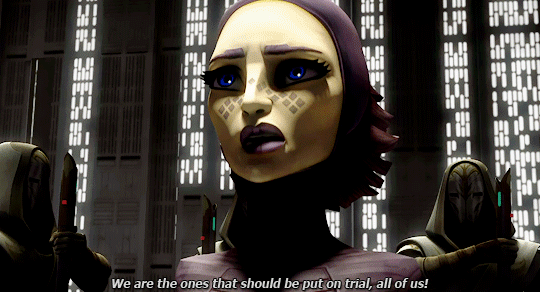
Jedi Master Dooku: "The Jedi blindly serve a corrupt Senate that fails the Republic it represents."
More than once, the Jedi are accused of siding with corrupt entities over victims. This is shown explicitly in the Tales of the Jedi, but it continuously remains obvious with the clones and the Ahsoka trial. Now, I've heard people accusing panicking teenage Ahsoka of "making herself look guilty", but the Jedi weren't even fully convinced of her guilt. The reason they jettisoned her was primarily political.
This is what Mace Windu says in response to Obi-Wan's protest that things don't quite add up and Ahsoka could be innocent.
Mace Windu: "I understand your sentiment, Obi-Wan. But, if the council does as you suggest. It could be seen as an act of opposition to the Senate. I'm afraid we have little choice."
Apparently, innocence is a matter of "sentiment". Again, politics, their dated mandate and the system matter more to the Jedi Order than fighting for the right thing. When laws are unjust, it is a moral imperative to resist them, and allowing unjust courts and slavery is too big a pill to swallow even for war. Plenty of fascist states had soldiers and civilians follow inhumane orders, systems and laws throughout history, it still doesn't absolve them of just going along with it.
Not all that Compassionate
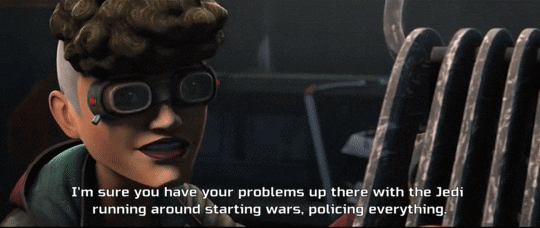
Ahsoka: "It's every citizen's duty to challenge their leaders, to keep them honest, and hold them accountable if they're not.”
From enabling slavery as opposed to resisting to just flat out callous decisions like never investigating Pong Krell's casualty numbers to leaving clones' bodies to rot while pausing a high stakes mission for the late Evan Piell to have a Jedi funeral, none of the Jedi's individual-based kindness absolves them of their role in the Republic's corruption and the systematic hierarchy of slavery that is GAR, draft or no.
Fives: "We are loyal soldiers. We follow orders, but we are not a bunch of unthinking droids! We are men! We must be trusted to make the right decision, especially when the orders we are given are wrong!"
At the end of the day, Fives was more of a hero than any of them and it shows. Resist, regardless! Sure, be smart and tactical, but resist, regardless. The fact we're even debating on the morality of system-propping organisations and characters allowing slavery for "the greater good" is making me despair.
125 notes
·
View notes
Text
For just a second the hall was silent, the young Hero's words echoing into oblivion. Their father's sword hung heavy in their hands, still levelled at the Usurper's throat. A second passed, then another, and then the Usurper began to laugh. The hero stilled with indignation, ready to run the traitor through, but something stilled their hand. It was not a mirthful laugh, nor scornful or mocking. It was low and dark and bitter as bile; the laugh of someone finally understanding a joke only to realise that they were the punchline. The Usurper laughed long and hard, even as the blade drew a shallow red line across their neck.
"Care to explain what's so funny?!" The hero bit out, patience run dry.
"Round and round the waltz goes on; though the dancers change, the dance remains." The Usurper chuckled.
"Speak plainly, murderer! Your last words aught to be coherent."
"Oh? Aught they?" They answered, grinning darkly. "Tell me Hero, why am I still alive?"
"What?"
"You had me by surprise. You killed my guards without a second's hesitation. If you wanted to, you could have killed me before I even knew what was happening. So why didn't you"
"I don't-" their rebuttal was cut short.
"I know why. You hesitated because this is personal. You want me to know what's going on. You want me to see my death coming and to know it is you who delivered it." Their voice was softer than the hero had expected, so far from the wrathful roar or sneering growl they had imagined. "Because you hate me. And rightly so. Gods know you have reason enough. So, Hero, tell me: what is it you want? Would you have me beg? Grovel? Do you want to see me on my knees, pleading for a mercy which we both know will never come?"
"What? No! Of course not!" They shouted, indignant.
"Of course. Because you are the hero. The good guy. Only a villain would want that. And yet, I am not dead. Because deep down, you did want that. You wanted to see me afraid and desperate, begging for my life. Even if you would never admit it, you know it to be true."
The silence hung thick in the air, and try all they might the hero couldn't bring themself to deny it. The Usurper raised an eyebrow, the smile on their lips as cold as it was sharp. They leaned in close, heedless of the blade still at their throat, their voice now barely a whisper.
"I thought so. You know why? Because I was you, once. Because years ago I stood where you stand, a knife to the throat of the man who murdered my father, just as that man had a decade before." They drew away, laughing again. "He told me you would come for me, just as he knew I would come for him. And soon you will share our fates. You have a decade, maybe two. Enjoy it while you can."
"What? But I haven't-" the hero cut themself off in horror, looking again at the two bodyguards they had slain.
"You barely even noticed them, right?" The usurper asked, half sympathetic, half mocking. "Just one last obstacle before the enemy you have been preparing to kill your whole life." The hero remained silent, frozen by regret, by fear of the blade which now hung over them, silent, waiting to fall. They did not know how long it was until they felt the warmth of a hand placed on their shoulder. They looked up, eyes locking onto those of their father's murderer. Eyes filled the empathy of someone who had walked the same road long before. The eyes of the person they despised more than any other. The person they were here to murder.
"What if I didn't do it?" They asked at last. "What if I let you go free?"
"Ah, don't get my hopes up. It wouldn't change anything." They answered, not unkindly. "The deed is done. You might as well get something out of it. Besides, I think we both know that was never going to happen. Not really. Too much blood on both our hands now."
"Yeah, you're right. Any final words?"
"Yeah. Do it clean, kid."
And so they did.
“You think I’m trying to get revenge for my father that was the king or lord or whatever title you could pull out of your head? No, my father was one of those incompetent and harmless guards you killed!
5K notes
·
View notes
Text
Tusks are usually found on primarily herbivorous creatures, especially when they grow from the lower canines. When not solely for display, they are often used to help a creature dig for roots and tubers, as seen in elephants and pigs. As such, since orcs are usually portrayed with tusks, they should be mainly herbivorous. In this essay I will...
71 notes
·
View notes
Photo

This is Gen
All street, no smarts, Gen is the primary POV focus in The Gentry. Her goal at the start is pretty simple; to make her life stable enough to allow her to maintain a relationship with her sister and friends without risk of being murdered or conscripted. No small task for a homeless vagrant with no education, money, or influence. Eventually this goal expands to not only helping herself, but others like her, eventually bringing her into conflict with the system which manufactures desperate situations like her own.
0 notes
Text
Aight, so i figure i should probably start talking about my WIPs on here, so lets fucking do this.
Currently I am working on a series called The Gentry, which follows a found-family of criminals, outcasts, and outlaws as they try to survive in the city of Karthwen. Beset by war, poverty, and civil strife, the city is a dangerous place, but perhaps there is opportunity to be found amongst the rapidly changing status quo. The protagonists will struggle to survive as they get caught up in the political machinations of the ruling class, pawns in a conspiracy that might change the world.
Featuring:
A gunpowder fantasy setting
explorations of class, religion, and criminality
plenty of LGBT+ representation
a fair amount of “on screen” injuries, so stay away if you dont like that
Same thing for sexual assault (not a focus and not “on screen”, but it will be referenced and discussed)
0 notes
Text
traits turned sour
honest - insensitive
persuasive - manipulative
caring - overprotective
confidence - arrogance
fearless - cocky
loyalty - an excuse
devotion - obsession
agreeable - lazy
perfectionism - insatisfaction
reserved - aloof
cautious - skeptical
self loved - selfish
available - distractible
emotional - dramatic
humble - attention-seeking
diligent - imposing
dutiful - submissive
assertive - bossy
strategic - calculated
truthful - cruel
26K notes
·
View notes
Text
Oh damn, now ive got to do this
Instead of writing a character outline for your story full of bulletpoints, what if you just flat out interviewed them?
I'd happily read five pages of my favorite authors sitting in a living room asking their characters about their feelings on Avocados for five minutes.
You think this is a joke but honestly you start down that road and suddenly you're talking about their feelings on equality and human rights and their thought process after the love of their life moved to Buttswan™, USA.
Or maybe that's just my undiagnosed ADD...
981 notes
·
View notes
Text
tips for setting the scene
it’s easy to get caught up in dialogue or a character’s internal dialogue and forget altogether that they, too, exist in their own physical world. as authors, it’s primarily our job to convey the exact amount of information: the reader is on a need to know basis, but they also need to know enough to draw their own conclusions. i’ll admit, it’s a difficult task, but here are some tips to help set a scene:
- imagine the world from the eyes of your character: how do they see things? do they see the big picture first or are they drawn to smaller details that others don’t often notice? what’s pulling their attention away from the action or their own thoughts?
- breathe life into your scenes: i don’t mean the english teacher’s equivalent of “the curtains were blue means that the character is sad.” i’m talking about the blue filter in Twilight that conveys the “constant cover of clouds and rain” and the shift from the Arizona desert to the cool Pacific Northwest. think about all the small details that convey information about a scene and allow the readers to make inferences. if the character walks along a street and the yards shift from overgrown hedges with frayed yard chairs and a birdbath containing a mini swamp to yards with freshly cut grass with white picket fences and ornate wreathes hanging on the doors, you’re providing all of the details for readers to make an inference. context is needed, too, but that will be provided in the whole of your novel or short story. don’t be afraid to provide details and use figurative language.
- spread out your details: did you feel bombarded in the last tip? i provided a lot of details quickly, all at once, without spreading them between action, dialogue, or internal dialogue. i’m not going to stop you from being the next J.R.R. Tolkien if that’s how you like to write, but try not to overwhelm the reader with details all at once. it will feel more natural if you spread things out and allow the reader to feel as if they, too, are with the character in their environment. this is more of a stylistic tip, so take it with a grain of salt and think about what will work best for your novel. always go back to that and to what your character is seeing. how is this all playing out for them? how can you put feeling into the scene?
- place your characters within the scene: where are they in their environment? how are they interacting with the people or objects in it? what do they think about these things? you don’t need to tell the reader everything your character does, but provide enough information so that we don’t get lost in their movement or stagnation. it helps to have someone else read your work if you’re struggling with this part. if they’re lost as to where the character is or what they’re doing, chances are a good portion of your readers will be confused, too. check out your prepositions. are there too many? too few? use them, but don’t abuse them.
happy writing! if you need help setting a scene or have any questions, our ask box is always open!
3K notes
·
View notes
Text
7 fool-proof ways to connect with your characters
Finding it a bit hard to connect to a certain character in your story? Here are 7 ways to get over that hump →
Start with the little things Every person has their own quirks, and so should your characters. A character might fall flat in your vision because of an absence of these small unique traits. Lean into this, think of habits they fall to when they get emotional, or weird little obsessions they linger on.
Give them a small trait of your own Don’t misinterpret this advice as writing yourself into the story! What I mean by this is to pick a small trait or a habit of your own to add a bit of yourself into a character you’re finding it difficult to connect with. This is a great trick to use if you’re writing a type of personality that differs from your own, and helps layer out character too!
Figure out what they want most Knowing a character's motivation - or what it is that actually drives them forward in the story, is one of the key things you should know about any character. If you’re finding it hard to connect to one of them, think about whether you’ve given them clear and tangible motivation within your story world.
And then figure out why they can’t get that Once you know what your character wants, what their goal might be, think of a reason why they can’t get it, or what that process of achieving the goal might be difficult for them. Usually, this works great if it comes from within - meaning that your character carries a flaw that stops them from acting on their goal.
Don’t underestimate kindness Flawed and morally gray characters are great. But don’t underestimate the power of a kind, positive trait. It’s what makes readers fall in love, and what will ultimately help you fall in love with the character, too. We don’t fall in love with a character’s snark, but with the emotions they hide behind the snark.
Give yourself time to get to know them Sometimes you don’t immediately click with all your characters, and that’s okay. That happens. It takes time to get to know what makes them tick, sometimes it takes writing them in a scene, then rewriting them in a different way in the same scene to feel out what’s most natural to them. If a character feels distant to you, let yourself explore a different approach to how you write them.
Don’t rush into who they are It can be really fun to keep a mystery about someone. And sometimes that’s all it takes for readers to be intrigued and feel connected to a character. This can work really well for you as the author, too. Don’t rush into writing down everything about your character in the first few chapters, keep a few details for later and work up to them.
2K notes
·
View notes
Text
Epithets aren't all evil
Here me out. I think there is a place for epithets in novel writing.
For those unfamiliar, epithets are when a person or thing is referred to by a quality they have, rather than their name or pronoun.
Examples:
"The older brother frowned, but the younger one laughed," versus, "James frowned, but Liam laughed."
"The red-haired girl sang," versus, "Annie sang."
"The King knelt before the peasant boy," versus, "King Kai knelt before him."
The problem most people have is that epithets rarely add anything to a story and they draw attention to themselves. And you should really only be drawing attention to important details, otherwise the writing starts to feel cheesy.
People tend to use epithets in one of two scenarios. Either we don't yet know the character's name (which is a valid and practical excuse), or the writer worries they've said the character's name too much and decides to switch things up (this is where the cringe happens. it's really common in fanfic).
However, I would like to argue for a third use of epithets -- a second acceptable use of epithets -- that everyone seems to forget. Because, when used in this manner, epithets are poetically delicious.
Consider, for instance, my favourite quote from Crime and Punishment:
“The candle-end was flickering out in the battered candlestick, dimly lighting up in the poverty stricken room the murderer and the harlot who had so strangely been reading together the eternal book.”
We know these character's names (and the name of the book). But changing this line to:
“The candle-end was flickering out in the battered candlestick, dimly lighting up in the poverty stricken room Raskolnikov and Sonja who had so strangely been reading together the Bible.”
it loses something, doesn't it?
Here, the three epithets are giving us symbolic context. Raskolnikov and Sonja reading the Bible is not a particularly important detail. But a murderer and a sex worker (two "sinners") reading the book of salvation together? That's some poetry, right there.
The epithets bring out the juxtaposition (contrast) that otherwise would not be evident and, in doing so, call attention to one of the book's central themes -- redemption.
The placement of this sentence is also worth noting. It is the last sentence of the chapter. Another issue people sometimes take with epithets is that they increase the narrative distance between the reader and the character, making them less relatable. Placing the epithet right at the end makes the reader feel like they are zooming out on these characters or looking down on them from above (symbolic given we're talking about the Bible, eh?). This give us a chance to put some distance between us and the characters, to reflect on the book and it's themes as a whole, to come to our own conclusions rather than having our judgement skewed by proximity to the characters.
When I first read it, it felt like taking a breath.
In conclusion, please
use epithets to show symbolic connections between characters, events, and objects.
use epithets sparingly, but use them for emphasis.
use epithets at moments where where it feels natural to increase the narrative distance, such as scene breaks and the beginning and endings of chapters.
do not use epithets unless they add something -- don't use them as a substitute for character's name if that name is already known.
Epithets aren't all evil.
1K notes
·
View notes
Text
Hello, I am also a writer, I write mostly “realistic” fantasy with plenty of Queer characters.
coming back to tumblr after the downfall of twitter and would love to connect with other fellow writers on tumblr. I write queer focused literary fiction + magical realism that often deals with bodies, food, and breaking free. let’s be pals?
#by realism i just mean there's a fuck ton of worldbuilding#because worldbuilding is easier than actually writing#writeblr
158 notes
·
View notes